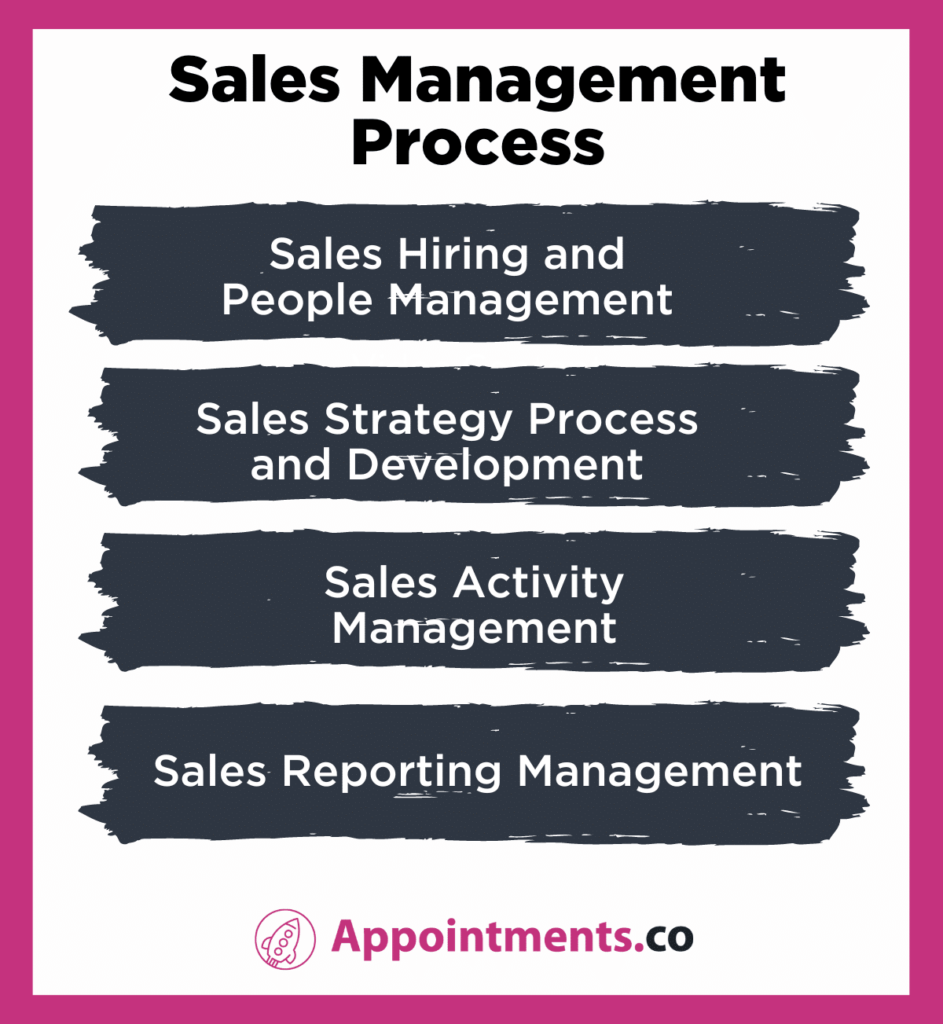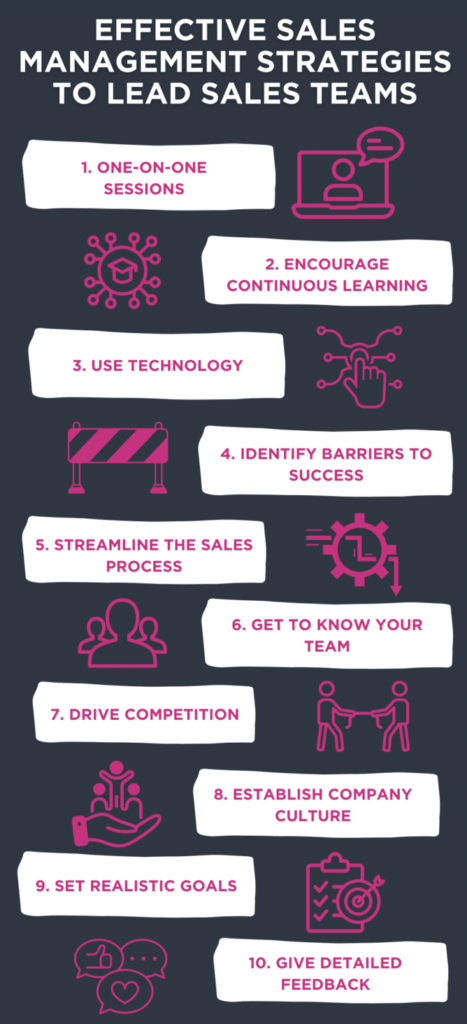Sales management is a business discipline that focuses on applying sales techniques and managing a firm’s sales operations. Sales managers are responsible for directing the sales teams to reach sales targets.
Table of Contents
- Role of Sales Management
- Sales Management Process
- Who Benefits from Sales Management?
- Best Sales Management Strategies
- Frequently Asked Questions (FAQs)
- Closing Thoughts
- Related Posts
Role of Sales Management
Sales management refers to the administration of the personal selling of the company’s product line, which includes the planning, implementation, and control of sales programs, as well as recruiting, training, motivating, and evaluating members of the sales force.
These management techniques deal with the department, which is responsible for sales, which deals with all the activities including product distribution, planning, supervising, and promoting sales.
The main objective of sales management is to increase customer numbers, hit revenue targets, or cut churn rates.
The sales pipeline gives the sales reps what stage each customer is currently at in your sales process. This pipeline management gives information that is crucial in deciding what steps have to be taken in order to move closer to closing a deal.
Sales Management Process
Sales managers manage at least four main components people, strategy, activity, and reporting.

1. Sales Hiring and People Management
The first step in the sales management process is hiring a solid sales team. This process involves writing strong job descriptions, interviewing eligible candidates, and working with HR to create fair sales compensation plans.
2. Sales Strategy Process and Development
Developing a sales strategy process can help identify areas to improve by comparing the current process with the company’s standards.
3. Sales Activity Management
Sales managers are responsible for overseeing the day-to-day activities, and accessing the sales performances of the sales rep to implement sales techniques.
4. Sales Reporting Management
The last step in the sales management process is to analyze and report on sales activity happening in the organization. This process includes reports on win rate, average sales cycle, and lead-to-opportunity conversion rate.
Sales managers are responsible for using this data for future sales revenue, and updating team standards and goals.
Who Benefits from Sales Management?
1. Sales Manager
The sales manager is the person held responsible for the sales management process in the company, the role of the sales manager’s job is to guide the sales rep in an effective sales performance.
2. Salesperson
A salesperson contacts the prospects in person, or by calling them and sharing the details of the product or services that they offer. This process makes the salesperson have direct contact with the prospects. The salesperson works closely with the manager regarding their sales performance.
3. Customer
The customer gets a much better experience from the sales management process as the information provided could be useful to them. The customer can make a decision whether to purchase the product or services or not.
Best Sales Management Strategies
A wll-planned strategy could make things better. Here is a list of ideas that can help your sales management team and process to hit their targets.

1. One-on-One Sessions
The sales teams have to get proper instructions about their role and responsibilities in order to reach peak performance. If your sales team is properly managed through a variety of customer interactions they will be better prepared to handle difficult situations.
One-on-one Sessions allow the sales reps to feel more confident in their approach to sales since they get clear instructions about their role. Coaching salespeople is important to have one-on-one sessions regularly to keep information fresh in their minds.
2. Encourage Continuous Learning
Learning is a continuous process and the company has to encourage the sales reps to pursue continued education on their own to perform at their best and to stay ahead of the competition.
Training and development programs help the sales team to stay on track with their skills to date. Career development increases the employees’ morale and thereby results in effective operations.
3. Use Technology
Technology is constantly evolving, and many parts of the sales process are becoming automated, the key to bringing technology into your sales team’s effort is to ensure it works with the tools and systems your team already has set in place. These technologies forecast sales that are an expression of expected sales revenue. This estimates how much your company plans to sell within a certain time period.
4. Identify Barriers to Success
The sales team might be struggling with barriers in their sales process. These barriers could be:
- Fear of rejection when a salesperson assumes that a cold call will result in a rejection. Do not let them assume, and help them to be hopeful that a cold call will result in a sale.
- Poor Communication can result in a lack of understanding between the salesperson and the customers. Ensure that they are listening more, and making phone calls more of a conversation rather than a pitch, which helps to build long-lasting relationships with potential customers.
- A lack of marketing results in missing out on a number of potential leads. Marketing helps the salesperson to sell to potential customers when has seen your product or service advertised on social media. This provides a level of knowledge and comfort for the prospects.
5. Streamline the Sales Process
Streamlining the sales process means attracting the right customers into your sales funnel. Social media platforms provide opportunities to meet customers, engage, and introduce them to your sales funnel. Hire an on-demand sales team to provide strategies for your business.
6. Get to Know Your Team
Knowing the team you are working with is absolutely necessary, when sales team people feel connected to their sales manager, they are more productive. When they feel engaged the profits of the organization’s sales team will rise therefore, leaders should always prioritize learning more about their team members.
7. Drive Competition
Driving competition is a powerful sales management strategy to boost your team. 25% of people are unaffected by competition; 25% wilt in a competitive environment; and 50% benefit from competition. Competition within the organization encourages teamwork, boosts morale, and enhances certain professional skills.
Competition in the industry where the company has to maintain a competitive advantage in the market with the ability to stay ahead of its present or potential competitors. Companies typically gain a competitive advantage by evaluating the strength and weaknesses of their competitors and seeing how they could improve their own performance to obtain an advantage.
8. Establish Company Culture
A strong company culture has always been important and the best way to improve the company culture is:
- Flexibility in scheduling, the location they work from, or how their office is set up.
- Professional development for the employees helps them advance in their careers, and want positions at companies that can help them develop and grow.
- Recognition is important for employees to perform well at their jobs.
9. Set Realistic Goals
The long-term goals, which should be realistic, give your team the confidence to work better. A good salesperson must be aware of what the competitors are offering for the same product or service. The customer wants to know what makes your product different from competitors. Realistic goals help you identify not only what you want, but also what you can achieve.
10. Give Detailed Feedback
98% of employees disengage from their work when they receive little or no feedback. In order to create a good company culture that promotes growth and success, you have to give feedback to your sales representatives. Ensure to give suggestions on improvements because this helps them to get one step closer to closing more deals.
Frequently Asked Questions (FAQs)
1. How can CRM streamline sales processes?
A CRM (Customer Relationship Management) streamlines your sales process by offering greater visibility on all of those prospects in the sales funnel. Sales management CRM helps the company’s success by generating leads, converting leads into contacts, and providing the service infrastructure needed to retain customers.
2. How to encourage healthy competition in the workplace for improving sales?
Ensuring that the company vision aligns with individual goals. Planning and setting goals is a great way for having a healthy competition with each one bringing your team one step closer to completing the larger goal.
3. What is the importance of sales management?
An efficient sales management process can help you provide the best experience for your customers. These customers will be more inclined towards purchasing your product or services.
4. What are the four primary aspects of sales management?
The four key components of sales management are the people, process, reports, and setting of a sales strategy.
Closing Thoughts
In sales management, it is important to keep in mind that a strong sales team begins with hiring the right salespeople. If the sales team is comprised of low-driven salespeople, you will likely see your team continue to struggle to find consistency and success over time.
A sales management system also known as sales management software, or sales CRM, is a program that is designed to make the sales process simpler. Salespeople can use this system to manage contacts, track deals, and clear tedious administrative tasks off their decks so they can focus on sales objectives.
Sales managers are responsible for hiring and firing employees, identifying the need for training, mentoring sales reps, and assigning tasks. Their role also includes creating a strategy and implementing sales management techniques and analyzing data in order to make informed decisions.



